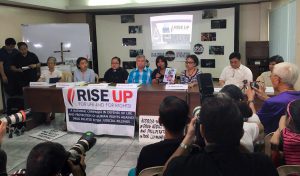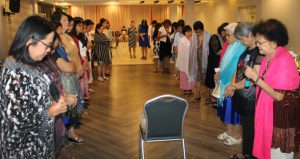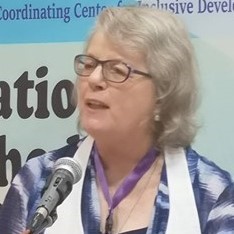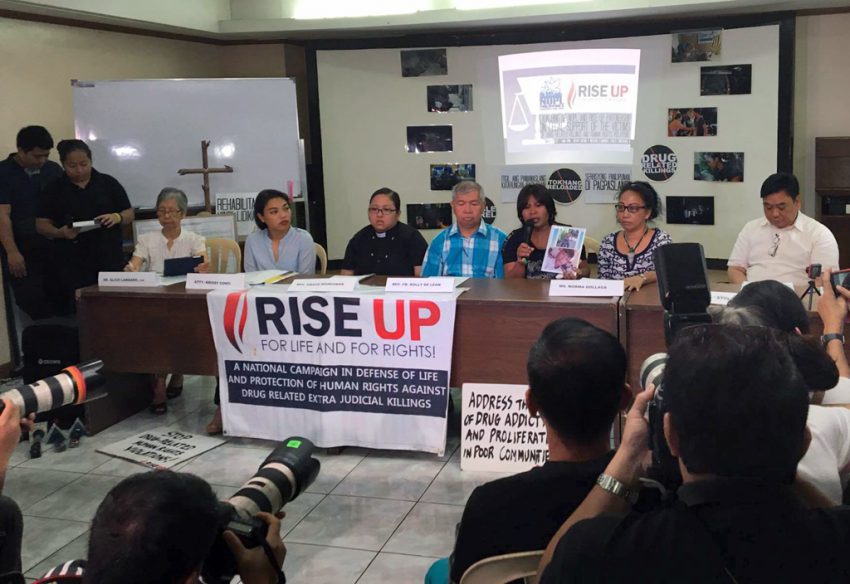At Pittsburgh Seminary, we seek to participate in God’s ongoing mission in the world by seeing and getting to know people as our neighbors. Challenged by Jesus’ parable of the Good Samaritan and inspired by (Mister) Fred Rogers ’62, who sang, “I have always wanted to have a neighbor just like you,” I am writing to introduce you to some of my neighbors, whom I want you to know. Today, I’d like to introduce you to my neighbor Sharon McCart.
Sharon was born and raised in Southern California. After working in chemistry research and development and teaching special education, she attended Claremont School of Theology. Following in the footsteps of her father and grandfather, she became a pastor, serving a Methodist church whose congregation was 98 percent Filipino. Then, she felt called to be a deaconess in The United Methodist Church, a lay order called to ministries of love, justice, and service. With the World Council of Churches, she went on a mission trip to the Philippines (the motherland of deaconesses in Methodist church) to learn about the political situation and human rights violations there. Over many trips back to the Philippines, Sharon has developed relationships with the deaconesses there. In her interviews with them, she is not attempting to evangelize or colonize, but simply to listen and learn from them, asking how they persevere in such a difficult context and where they find joy in their ministry. Her final project for the doctor of ministry degree focus in creative writing and public theology is a nonfiction book with the working title “A Journey of the Heart: What I Have Learned from Deaconess/Home Missioners in the Philippines.”
– The Rev. Dr. Donna Giver-Johnston, Director of the Doctor of Ministry Program at Pittsburgh Theological Seminary
Service Together and Presence in Suffering
“Who is my neighbor?” Jesus answered that question by pointing to a Samaritan, a member of a marginalized group, scorned and “othered” for their heritage and for worshiping on a mountain instead of in Jerusalem. They were a group who were not seen as worthy of any kind of relationship.
How do I answer that question? By telling my own story.
I have made six trips to the Philippines, beginning in 2017. I have made many friends there. Most are United Methodist deaconesses. While most of them serve congregations, others focus on issues of justice and compassion, serving the poor and oppressed. I want to tell you about deaconesses Norma and Rubylin.

These two remarkable women run two non-profit organizations: Dambana and Rise Up for Life and Rights. Through these organizations, they love their neighbors as themselves. Through Dambana, they show compassion, wading through the floodwaters of typhoons and the mud of landslides to bring food to those who are hungry. Through Rise Up, they work for justice for women whose husbands, brothers, and sons have been victims of extrajudicial killings, giving them a time to worship and pray and empowering them to work for justice and support one another. These poorest of the poor, these bereaved women who are unknown by most people, are Norma’s and Rubylin’s neighbors—and mine.

On my most recent trip to the Philippines, I attended a day-long Rise Up event. We worshiped together. There was a time for Bible study in which the women were encouraged to connect the Scripture to their own lives. A time to share their stories of grief. Several shared how Rise Up had helped them to move on with their lives. Loved ones were memorialized, candles lit. At the end of the day, the women went home in jeepneys and vans with bags of rice.
The Church Has Come to Me
Norma shared one woman’s story with me, and she arranged for me to sit next to this woman during worship. This woman and I don’t share a language, but we share a belief in God. We smiled at each other. We prayed next to each other. I know she is my neighbor. Here is the story Norma told me:
“After her son was shot dead by two masked men on a motorcycle, she had sought justice, but the police did not investigate. She began going to every church in the area, asking why her son had to die. There is no answer to that, really, but she kept asking. Then, Norma and Rubylin came to her community. They prayed for her and with her. The woman told them, ‘I have gone to every church looking for answers, but now the church has come to me.'”
“The church has come to me.” Isn’t this what it means to be neighbors? To be the church that comes to others as the Samaritan came to the man left for dead on the side of the road? This is what it means to me. To practice a ministry of presence for each other, all around the world. Hands reaching out, hearts open to each other. Neighbors one and all.
 Sharon McCart, is a Doctor of Ministry student in the Creative Writing and Public Theology cohort at Pittsburgh Theological Seminary and a graduate of Claremont School of Theology. She is a deaconess in The United Methodist Church appointed to work in disability ministries and to a project building relationships between deaconesses and home missioners in the United States and the Philippines.
Sharon McCart, is a Doctor of Ministry student in the Creative Writing and Public Theology cohort at Pittsburgh Theological Seminary and a graduate of Claremont School of Theology. She is a deaconess in The United Methodist Church appointed to work in disability ministries and to a project building relationships between deaconesses and home missioners in the United States and the Philippines.

